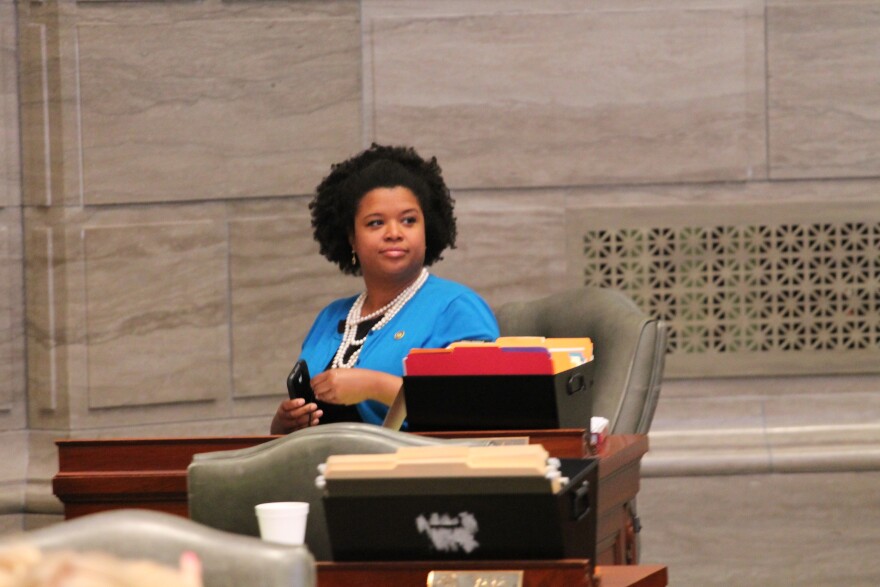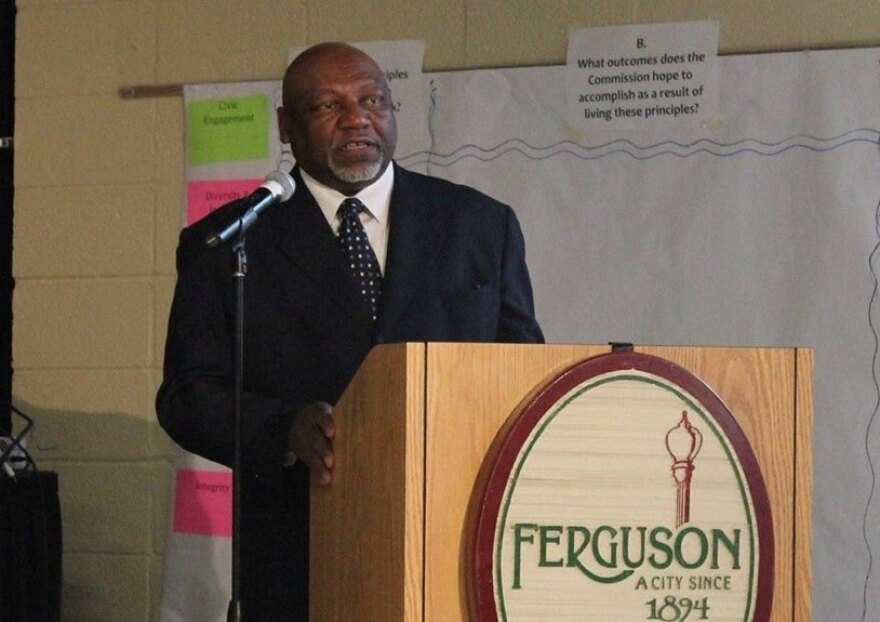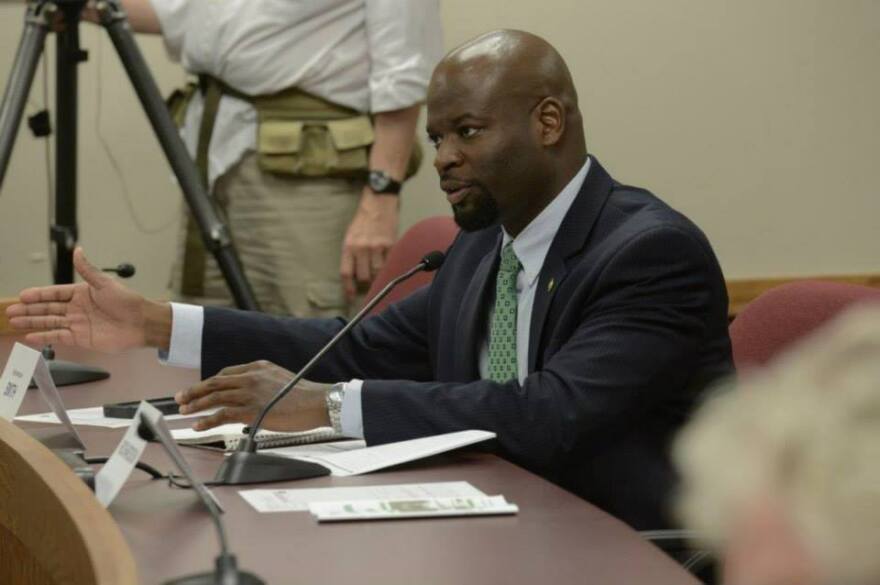At first glance, state Sen. Bob Dixon wouldn’t be an obvious choice to spearhead legislation responding to the unrest in and around Ferguson.
The Springfield Republican is far removed from the demonstrations and anger that has gripped Ferguson over the past seven and a half months – 225 miles to be exact.
But Dixon told St. Louis Public Radio he has “paid very, very close attention to the events from August all the way through to the holidays in Ferguson.” The chairman of the Senate Judiciary Committee took it upon himself to read the Department of Justice’s report on the Ferguson Police Department – and was taken aback by some of the anecdotes within it.

“This is incomprehensible to see this kind of, this depth of problems,” Dixon said. “And it would begin to answer some of the questions that Missourians in other parts of the state have been asking. Why are the people so angry? We don’t know all the reasons. But that would begin to answer some – if even half of the things in the report are true.”
Dixon is perhaps emblematic of how the Missouri Senate is dealing with Ferguson-related legislation. The chamber passed a tough bill restricting fine revenue in municipal budgets – and is working on changing police and municipal court procedures.
“I don’t want to say that we have all the answers. I don’t want to say that everything in the report was correct,” Dixon said. “But we need to dive in and make sure we really address these issues because that’s what we’re supposed be here for.”
The tenor and pace in the Missouri House stand in sharp contrast to the Senate. Members of the state’s black caucus say they are facing difficulties getting their bills through committees. Even though it’s still relatively early in the legislative session, some see the lack of urgency as a major concern – especially since Ferguson’s troubles have become a national phenomenon.
“People are going to have to rise up and fight this battle themselves until they get attention from the state legislature or cities,” said state Rep. Tommie Pierson, D-Bellefontaine Neighbors. “I’m saddened the legislature has an opportunity to do something for a vast number of people in this city, and they’ve decided not to do it.”
Senate's progress

Before the session began in January, legislators from both parties introduced several Ferguson-related bills. Some of those measures have advanced through the Senate, typically the tougher chamber to get bills passed.
Such bills include:
- Reforming the state’s municipal court system, including curtailing the percentage of revenue that can be incorporated into a city’s budget. State Sen. Eric Schmitt’s legislation, which unanimously passed the Senate, lowered the threshold to 10 percent – and included stiff penalties for non-compliance.
- Eliminating “failure to appear” penalties for traffic offenses, a major headache for residents in St. Louis County. Schmitt’s bill passed out of committee earlier this month.
- Revising the state’s use of force statute. A bill Dixon sponsored made it out of his committee last week.
- Incorporating procedures for how law enforcement responds to protests. Some elements of a wide-ranging bill sponsored by state Sen. Maria Chappelle-Nadal, D-University City, were combined into Sen. Doug Libla’s legislation. That includes making counselors available to people during a civil unrest and prompting police officers to wear name tags.
Chappelle-Nadal, whose district includes Ferguson, said Republican senators like Dixon have been helpful in getting legislation moving through the Senate. She noted that Dixon “spent a number of days in my Senate district alongside protesters.”

“So he actually gets it,” Chappelle-Nadal said. “A lot of people out there want to pretend like they have the answer to Ferguson but never stepped foot and never said a word when it came to Ferguson. Which is a problem. If there are Republicans that want to have pieces of legislation that do a lot of good, I have no absolutely no problem with that.”
Senate President Pro Tem Tom Dempsey, R-St. Charles, also noted the Senate made progress on state Sen. David Pearce’s legislation altering the state’s school transfer law. That issue dominated the legislative session last year but didn’t make it to the finish line after Gov. Jay Nixon’s veto.
“The access to a quality education and the student transfer bill is an underlying problem in many of these communities – and giving people a way out,” Dempsey said. “Members have been working together well on that issue. ... We haven’t had a hang-up on any of these policies.”
Frustration in the House

During a press conference earlier this month, several House Democrats expressed dismay that their Ferguson bills weren’t moving through committees particularly quickly.
For example: State Rep. Sharon Pace, D-Northwoods, introduced several bills at the beginning of the session – including ones requiring body cameras and sensitivity training for police. None has made it out of a House committee yet.
“I think there’s a certain agenda and who knows what that is. I don’t think Ferguson is at the top of the list, though,” said Pace, whose House district includes Ferguson. “I don’t know if they’re going to look at the bills with the actual teeth in it to make some full changes that’s required.”
It’s not just Pace. State Rep. Rochelle Walton Gray, D-Black Jack, introduced over a dozen bills to change police practices. Only one has received a hearing so far. And Pierson’s bill changing the state’s use of force law also hasn’t gotten a hearing yet.
“After spring break, if you have not gotten your bill to committee, more than likely you won’t,” Pierson said. “Even if it does, it won’t come out.”
Pierson and other members of the Black Caucus have been critical of House Speaker John Diehl’s earlier comments that the House won’t pursue a “Ferguson agenda.” Instead, Diehl, R-Town and Country, has said that he wants to focus on broader issues – including economic development and urban education.
That type of mentality, Pierson said, is unacceptable.
“Ferguson is one of the biggest issues in this state -- not only in this state, but the nation,” Pierson said. “And this House leadership has decided not to deal with it at all. I think that’s a travesty.”
State Rep. Clem Smith, D-Velda Village Hills, said the difference in tone between the House and the Senate may come down to how each chamber is structured. While the House tends to be more combative, Smith says, senators often work more closely together.
“They always say that over in the Senate, there’s a different environment where everybody gets along a little bit more,” Smith said. “It’s not as aggressive and contentious. So maybe that’s it. Maybe they’re sitting down next to each other, talking about how ‘hey, we see this as an issue. We need to do something.’ It doesn’t matter where you live in the state because when the Ferguson situation happened, the whole state looked bad.”

And not everybody is happy with how the Senate is proceeding. For instance, the Missouri Press Association expressed concerns about making the footage from body cameras a closed record to the press. And others aren’t convinced that Schmitt’s bill constricting fine revenue for cities deals with the core issues that came about from Brown’s death.
“There are people who are out there who believe that the municipal court reform bill, which I support fully, is going to be the answer. They’re going to be surprised,” said Chappelle-Nadal.
Time to panic?

At this point of the session, it’s not that unusual for bills to be moving through the legislative process still. It’s why state Sen. Jamilah Nasheed, D-St. Louis, isn’t worried that Ferguson-related bills haven’t it made it to Gov. Jay Nixon’s desk yet.
“I think it’s way too early to start panicking right now,” Nasheed said.
Both Diehl and House Majority Leader Todd Richardson, R-Poplar Bluff, said the House is ready to deal with marquee bills after spring break – including Schmitt’s bill limiting municipal fine revenue. Diehl also said the House plans to take up legislation to change the state’s use of force statute.

“I don’t think any of this is ‘Ferguson-related,’” Diehl said last Thursday. “I think it’s a mistake to try to … fashion legislation to address a specific situation. I think we have to look at the culture and we have to look at the overall issue of what’s happening. So what’s happening across the state? There’s a lack of educational opportunities. We’ve addressed that by trying to make sure that every child has access to a quality education by passing the transfer bill.”
Diehl also said the House plans to address what he termed “predatory practices by municipalities to fine and collect money from their own citizens and the citizens from other places under the threat of warrants and the traffic system.”
“Those types of systemic issues may lead or be a root cause of some the social issues that we have,” Diehl said. “But it’s not in reaction to a specific incident.”
With protests possibly ramping back up as the weather gets warmer, Chappelle-Nadal said the legislature is under added pressure to produce results – not just talk.
“We can play around here and pretend that we care about Ferguson or we can actually care about Ferguson,” she said. “Because when Ferguson goes down, the rest of the state is going down with it.”
Dixon, the Republican senator, said he’s up to the challenge to help the General Assembly accomplish something.
“A lot of people here in the legislature are striving to get to the right precise decisions,” Dixon said. “It’s not going to be perfect. And we’re going to do everything we can to accomplish the most that we can for the people in this particular situation.”
St. Louis Public Radio reporter Marshall Griffin provided information for this story.
On the Trail, a weekly column, weaves together some of the intriguing threads from the world of Missouri politics.









